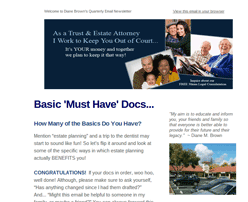Realities of Probate
As you read the information provided below, please take a deep breath. When the realities of probate settle in, it can seem a daunting task. You are welcome to review this basic information and be in touch with any questions you may have. If you are considering setting up a Living Trust… this will likely get you moving!
What is Probate?
When a will “goes through probate” is references the legal process it must go through in order to prove its validity in the eyes of the law. Until a will is admitted to probate, a court will not allow the distribution of the decedent’s property to the heirs.
In general, until a will is probated, it has no legal standing. Any will should be probated immediately, and may not be legally suppressed. The person in possession of the will, often a spouse or the decedent’s attorney, must produce it within a specified time. Failing to do so may incur penalties. It important to note, there are also penalties for concealing or destroying a will. Probate proceedings are usually held in the state in which the decedent had permanent residence at the time of death. If the decedent also owned real property in another state, the will which disperses these assets must be probated in that state as well.
Three Reasons to Avoid Probate
- The Expense – Probate is expensive and time consuming. Attorney’s fees are based upon the gross value of the probate assets. Read more about the expenses related to probate.
- The Lengthy Process – The probate process also takes time – the average length is twelve months. While the probate is open the personal representative may not distribute any assets without court permission. This may cause hardship for family members who need money right away.
- No Privacy – Finally, anyone can read the court file. The file has a list of all assets and their values. It also contains the names and address of all relatives of the decedent and the beneficiaries of the estate.
Read more about the Benefits of a Living Trust.





